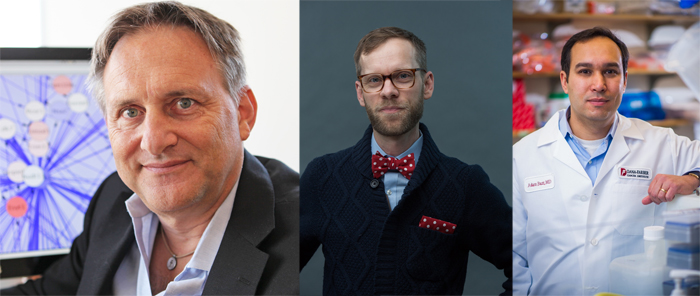
Three of the investigators in new Columbia, Broad Institute research collaboration aimed at gastric and esophageal cancer; L to R: Dr. Andrea Califano, Dr. Cory Johannessen, and Dr. Adam Bass (Johannessen image: Martin Adolfsson; Bass image: Sam Ogden/Dana-Farber Cancer Institute)
A research collaboration underway between Columbia’s Department of Systems Biology, the Broad Institute of MIT and Harvard, and Columbia University Medical Center (CUMC) is working to accelerate the discovery of new cancer drug combinations targeted at gastric and esophageal cancer. These tumors have not yet attracted prominent research focus and attention, and yet the general outcome for patients with these diseases is poor. According to the American Cancer Society, survival rates are only 20% at five years after diagnosis.
The newly formed research alliance between research teams at Columbia and at the Broad Institute came about thanks to a four-year gift by the Price Family Foundation, known for its philanthropic support of education, health, and biomedical research.
The Columbia-Broad team includes Dr. Andrea Califano , cofounder and chair of the Department of Systems Biology; Dr. Adam Bass , associate member of the Broad Institute; Dr. Cory Johannessen, senior research scientist at the Broad Institute; Dr. Josh Sonnett , the director of The Price Family Center for Comprehensive Chest Care, Lung and Esophageal Center at Columbia; and Dr. Naiyer A. Rizvi , the Price Chair in Clinical Translational Research at Columbia.
In 2016, the Price Family Foundation suggested that a team of scientists at the Broad Institute meet with researchers from CUMC. At the time, the Foundation was eager to leverage the project at the Broad—where researchers had uncovered an interesting finding for gastric and esophageal cancer—with innovative cancer systems biology work it was supporting at CUMC, focusing on the same diseases.